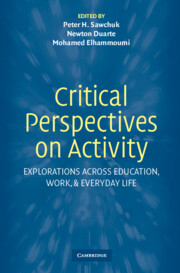Book contents
- Frontmatter
- Contents
- List of Contributors
- Foreword by Seth Chaiklin
- Acknowledgements
- 1 Introduction: Exploring Activity Across Education, Work, and Everyday Life
- SECTION I CRITICAL PERSPECTIVES ON THEORY
- SECTION II EDUCATION
- 5 The Importance of Play in Pre-School Education: Naturalisation Versus a Marxist Analysis
- 6 Estranged Labor Learning
- 7 “Our Working Conditions Are Our Students' Learning Conditions”: A CHAT Analysis of College Teachers
- SECTION III WORK
- SECTION IV EVERYDAY LIFE
- References
- Index
5 - The Importance of Play in Pre-School Education: Naturalisation Versus a Marxist Analysis
Published online by Cambridge University Press: 10 December 2009
- Frontmatter
- Contents
- List of Contributors
- Foreword by Seth Chaiklin
- Acknowledgements
- 1 Introduction: Exploring Activity Across Education, Work, and Everyday Life
- SECTION I CRITICAL PERSPECTIVES ON THEORY
- SECTION II EDUCATION
- 5 The Importance of Play in Pre-School Education: Naturalisation Versus a Marxist Analysis
- 6 Estranged Labor Learning
- 7 “Our Working Conditions Are Our Students' Learning Conditions”: A CHAT Analysis of College Teachers
- SECTION III WORK
- SECTION IV EVERYDAY LIFE
- References
- Index
Summary
The main aim of this chapter is to analyse the similarities and differences between Froebel on the one hand and Elkonin and Leontyev on the other, taking into account the contributions that these authors have made to child development psychology and pre-school education. To this end, we will make a comparison between Froebel's ideas and those of Activity Theory with respect to the role of play in child development at pre-school age. The text is organised into three parts. The first one aims at presenting a brief description of Froebel's conception of child development and the role of play. The objective of the second part is to analyse Elkonin/Leontyev's conception of the same subjects. In the third section, we present some conclusions that have been drawn from this comparative analysis.
PLAY ACCORDING TO FROEBEL – SELF-ACTIVITY AND THE VITAL UNITY WITH RESPECT TO CHILD DEVELOPMENT
To present the principles of child development that are the foundation of Froebel's conceptions of play, we take into account three works by this author: The Education of Man, The Mottoes and Commentaries of Friedrich Froebel's Mother Play, and Pedagogics of the Kindergarten.
In his book The Education of Man, Froebel (1887) explains how human development, especially that of children, occurs. He affirms that God is the beginning of all things and that the life of human beings must seek to harmonise itself with Him and with all other aspects of divine creation. The divine nature of everything that exists on earth reveals God's essence.
- Type
- Chapter
- Information
- Critical Perspectives on ActivityExplorations Across Education, Work, and Everyday Life, pp. 75 - 88Publisher: Cambridge University PressPrint publication year: 2006



